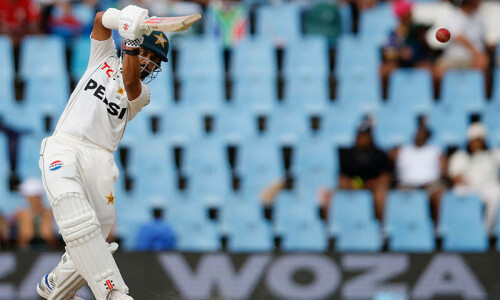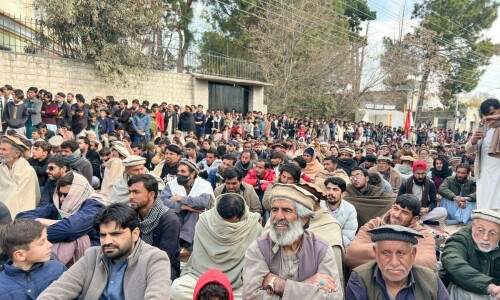SARAJEVO: For centuries, Sarajevo was known as “Europe’s Jerusalem”, where Christianity, Islam and Judaism lived in harmony. In the 1990s, the city became synonymous with religious enmity, as its Christian Orthodox Serbs and Muslim Bosniaks plunged into a calamitous cycle of warfare.
Pope Francis hopes to restore some of the earlier legacy on Saturday during his visit to this city that, two decades ago, seared itself on the world’s imagination with images of Serbian sniper fire and bombs killing innocent civilians.
The majority-Muslim city is gearing up to give the pontiff an ecstatic embrace. Already Pope Francis teacups are being sold on souvenir stands next to the statue of St John Paul II on the main square. Muslim carpenters have crafted a wooden throne for the pope to sit on and Catholic craftsmen an altar for the Mass he will perform. In Srebrenica, the scene of Europe’s worst carnage since World War II, a mixed choir of Muslim and Christian Orthodox children is practising a song of love they will sing to the pope.
The city’s mosque, synagogue, Roman Catholic cathedral and Eastern Orthodox Church stand less than 100 metres away from one another other. But that interfaith harmony was blown apart by the war fought between the country’s ethnic Serbs, Croats and Bosniaks from 1992 to 1995. The conflict left 100,000 dead and displaced half of the population.
Two decades later, the wounds still fester, and the problems remain unsolved. Bosnia’s Christian Orthodox Serbs want a breakaway state; Muslim Bosniaks want a unified country; and Roman Catholic Croats want their own autonomous region. “I am coming to you with God’s help to strengthen the Catholics in their faith, to give my support to the ecumenical and interfaith dialogue and above all, to encourage peaceful coexistence in your country,” Pope Francis told Bosnians in a video message this week.
With this mission, Pope Francis is following in the footsteps of St John Paul II, who tried to visit Sarajevo during the war to call for an end to fighting. Back then, Sarajevo’s hungry and exhausted residents were dodging Serb sniper bullets when posters appeared throughout the city announcing the pope’s visit. He stood in the picture with arms wide open, as if to embrace the city that felt abandoned and betrayed by the world. “You are not alone,” the poster read. “The pope is with you.” People stood in front of it, crying.
The trip was called off for security reasons. But Pope John Paul came in 1997 to celebrate an emotional Mass in Sarajevo’s main stadium, attracting thousands of Catholic Croats to the city for the first time since the fighting ended. Pope John Paul returned to Bosnia again in 2003 — this time to the Bosnian Serb stronghold of Banja Luka, where he apologised for World War II crimes committed by Catholics against Serbs. His inspirational plea for peace prompted Sarajevans to place his statue on the main square last year.
Meliha Burazerovic, 56, lives along the route Pope Francis will take to get to the city stadium, where he will celebrate a Mass in front of some 60,000 people. Pope John Paul took the same route 18 years ago. “Back then I dyed my hair for the occasion but before I could dry it, his motorcade passed by,” the Muslim woman said. “This time I’m doing it on Friday so I am ready for Saturday. I hope the weather will be favourable.”
In central Bosnia, the Muslim Hajdarovac family volunteered to carve a special chair in their workshop for the pope to sit on during the Mass. “It was hard work,” said carver Edin Hajdarovac. “Since this chair is for Pope Francis we’ve put all our love into it, and we tried to make it perfect.” In Srebrenica, a choir made up of Christians and Muslims has practised the song ‘Love People’ for weeks so they can sing it flawlessly for Pope Francis at the Saturday Mass.
More than 33,000 Bosnian Catholic Croats will be heading to Sarajevo to attend the Mass. Pope Francis will try to encourage them to stay in Bosnia, despite the country’s 40 per cent unemployment rate, which has driven many away. “I am encouraging you Catholics to stay with your countrymen,” Pope Francis said in his video message, “to build a society moving towards peace, coexistence and cooperation.”
The pope’s spokesman, The Reverend Federico Lombardi, said it was important to send a message of peace and reconciliation from the war-scarred Bosnian capital. “Sarajevo is of enormous historical and cultural significance for the last century,” Lombardi said. “The First World War started there, and it is a place where the issue of peace and war is fundamental and extremely current.”—AP
Published in Dawn June 5th, 2015
On a mobile phone? Get the Dawn Mobile App: Apple Store | Google Play














































